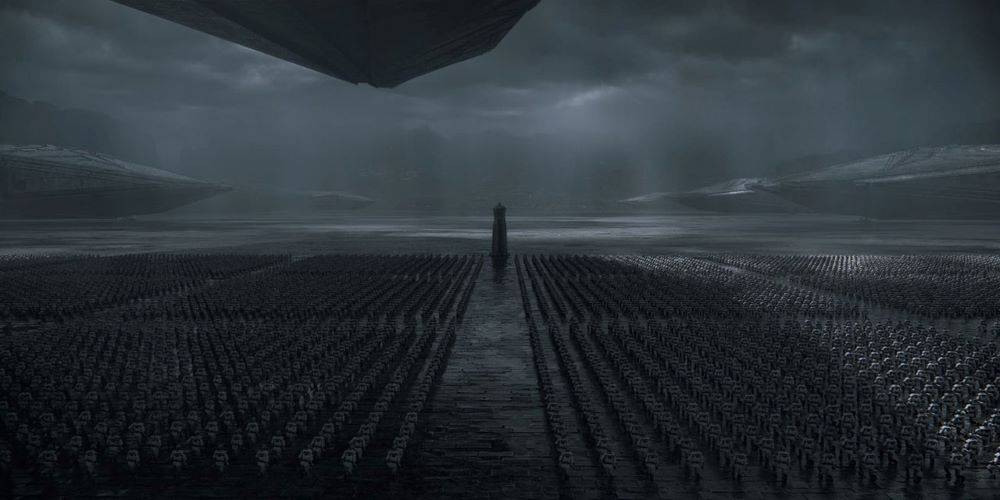
"Dune: Part Two,"' starring Timothée Chalamet as Paul and Zendaya as Chani, is "a haunting realization of the dangers of religious fundamentalism," writes Kevin Christopher Robles. (Courtesy of Legendary and Warner Bros. Entertainment Inc.)
What does it mean to have faith?
This is the central question "Dune: Part Two" poses to its audience, and director Denis Villeneuve critiques religious fundamentalism with both epic scale and heartbreaking intimacy. The theme is something of a specialty of Villeneuve's, with previous sci-fi efforts "Arrival" and "Blade Runner 2049" tackling similarly grandiose ideas with cinematic beauty and complex character work.
In the year 10191, Arrakis — the desert planet also known as Dune — is the only source of the spice melange, a chemical that makes distant space travel possible. For this reason, the native people of Arrakis, the Fremen, have been continually exploited by outside forces seeking to gain access to the valuable natural resource. In the first film, the noble House Atreides was put in charge of Arrakis by the emperor and aimed to improve relations with the Fremen. However, they were attacked by a rival house, the Harkonnens, in a bid to gain control of the spice. Seemingly the only survivors were the heir of House Atreides, Paul (Timothée Chalamet), and his mother, Lady Jessica (Rebecca Ferguson). The end of the first film leaves the pair to make an uneasy alliance with the Fremen and, perhaps, find a way to get back at the villainous Harkonnens.
While this makes for terrific science fiction on paper, it also reveals much more. Like many great works of science fiction and fantasy, the 1965 novel Dune reflects the time that it was written. Author Frank Herbert was a journalist and a speechwriter before he was a novelist and held staunchly anti-imperialist, anti-dogmatic views of entrenched establishment — particularly of American involvement in Vietnam and McCarthyism at home. This manifested in his work in many ways, but as his magnum opus, Dune dealt with his deepest concerns: authoritarian governments, overreliance on technology and, most important to this new film, religious fundamentalism.

"Dune: Part Two" takes place In the year 10191 on Arrakis, the desert planet also known as Dune. It is based on the 1965 novel Dune, written by journalist and speechwriter Frank Herbert. (Courtesy of Legendary and Warner Bros. Entertainment Inc.)
The Fremen are a deeply religious people, with a faith tradition rooted in a blend of Zen Buddhism and Sunni Islam. They believe that a messianic figure known as the Mahdi will come from off-world and deliver them to paradise. Paul seems to fit many of the characteristics of the Mahdi, and rumors begin to spread that he is the savior that will bring salvation to the Fremen. But Paul is all too aware that the very concept of the Mahdi has been seeded on the planet Arrakis by the Bene Gesserit, a sisterhood of witches that includes Paul's mother. Throughout the film, he is torn about whether he should embrace his "destiny" as the Mahdi.
The great conflict of the narrative, then, is Paul’s struggle: He understands the artificiality of his own status as a messiah, but also knows this deception will allow him to lead the Fremen to avenge the destruction of House Atreides at the hands of the Harkonnens and grant the native peoples their freedom.
This is all very grand, very high-concept sci-fi stuff; but the magic of the film is Villeneuve's ability to make this complexity not only comprehensible but humanly compelling. He does this primarily by literalizing the conflict between two Fremen characters, Paul’s love interest Chani (Zendaya) and the leader of a Fremen faction, Stilgar (Javier Bardem).
Stilgar is, at his core, a fundamentalist. He is someone who wants to believe in the promise of the Mahdi, even though he is at first a doubter. Once he begins to see the signs that Paul may be this messiah, he latches onto the idea with zealotry. One amusing scene has Paul denying that he is their savior, which Stilgar interprets as further proof that he is the Mahdi: "He is too humble to say he is the Mahdi, which is exactly what the Mahdi would say!"
Advertisement
Meanwhile, Chani harbors little faith in the Mahdi. In an early scene, we see her rebuff the very concept: "You want to control people? Tell them a messiah will come. They'll wait. For centuries." Regardless, Chani begins to believe in Paul as a person whose heart is in the right place, which is why she falls in love with him despite her initial misgivings — even though she never believes he is who everyone says he is.
When the Harkonnens begin attacking the Fremen in earnest, Paul is forced to lean into the idea of the legend — alienating Chani and further radicalizing Stilgar. Against his better judgment, Paul sees that the only way to win may be to manipulate and take advantage of the fundamentalist beliefs of his newfound home, and embrace his role as a false idol.
Shalamet is incredibly convincing as an emerging cult leader, one torn between two different and equally awful futures. As Chani, Zendaya's eyes reveal heartbreak. But the real outstanding performance may be Bardem's, who is simultaneously comical and terrifying in his commitment as Stilgar.
There are big ideas here, sandwiched between breathtaking action sequences and artful depictions of bizarre alien landscapes. In many ways, Villeneuve has pulled off an incredible feat: He has created the platonic ideal for high-concept science fiction, blending tremendous visual spectacle with three-dimensional characters embodying complex political and spiritual ideas. "Dune: Part Two" may be one of the best science fiction films ever made, but it is also a haunting realization of the dangers of religious fundamentalism, and how — even with the best of intentions — it can be corrupted and turned into something horrifying.







